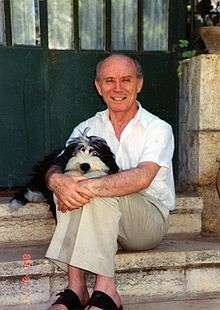Gary Bertini
Gary Bertini (Hebrew: גארי ברתיני, May 1, 1927 – March 17, 2005) was one of the most important Israeli musicians and conductors.
Gary Bertini | |
|---|---|
 | |
| Born | May 1, 1927 |
| Died | March 17, 2005 (aged 77) |
| Citizenship | Israeli |
| Occupation | Conductor and Composer |
| Spouse(s) | Rosette Bertini |
| Website | www |
Biography
Gary Bertini was born Shloyme Golergant in Bricheva, Bessarabia, then in Romania, now in Donduşeni District, Moldova. His father, K. A. Bertini (Aron Golergant), was a poet and translator of the Russian (Leonid Andereyev) and Yiddish (A.Sutzkever, H. Leivick) literature into Hebrew, and of the Hebrew works into Yiddish. His mother Berta Golergant was a physician and biologist. They immigrated to Palestine in 1946. Gary studied music at the Music Teachers' College in Tel Aviv and then in Milan, Italy, and at the Paris Conservatoire.
Upon returning to Israel, Gary Bertini established Rinat (the Israel Chamber Choir) in 1955. He was musical advisor to the Batsheva Dance Company and composed incidental music for numerous productions of Habima, the Israel national theater, and the Cameri Theatre. He founded the Israel Chamber Orchestra in 1965 and was its conductor until 1975. He was the music director of the Israeli opera between the years 1988-1997.
Bertini was conductor of the Jerusalem Symphony Orchestra from 1978 to 1986. He was also the artistic director of the Israeli Opera from 1988 to 1997. He promoted Israeli music and helped shape it.
Bertini was hospitalized while in Paris, then transferred to a hospital in Tel Hashomer, Israel. He died there on 17 March 2005 and was buried in Kfar Vitkin.[1]
Bertini's work also took him outside Israel. He was music advisor to the Detroit Symphony Orchestra from 1981 to 1983 and the Principal Conductor of the Cologne Radio Symphony Orchestra from 1983 until 1991. He also served as general music director of the Opern- und Schauspielhaus Frankfurt from 1987 to 1990, the Tokyo Metropolitan Symphony Orchestra from 1998 to 2005, and, just before he died, director of the Teatro di San Carlo in Naples. He also worked as a guest conductor with the Hamburg State Opera, Scottish Opera, La Scala, Opéra National de Paris, and the Berlin Philharmonic among other organizations.[2]
Bertini's recording of the complete cycle of Mahler symphonies (EMI Classics 40238) is very well regarded.[3][4][5]
Awards
- 1978 - Israel Prize for Music, Israel [6]
- 1995 - Abiatti Prize: Best Conductor, Italy
- 1998 - Abiatti Prize: Best Operatic Conductor, Italy
- 2000 - Prime Minister Award for Composers, Israel
- 2003 - Académie Charles Cros – Grand Prix Audiovisuel & DVD pour Prokofiev: La Guerre et la Paix, France
See also
References
- "Israeli Conductor Gary Bertini Dies, 77". 18 March 2005 – via Haaretz.
- "Obituaries: Theodor Uppman, stalwart Met baritone, dies at eighty-five; conductor Gary Bertini; editor Elizabeth S. Crow; sopranos Dorothy Dow and Una Hale; author William Murray; musicologist Stanley Sadie; impresario James Stuart". Opera News. 69 (12). June 2005. Retrieved May 21, 2009.
- Web(UK), Music on the. "Mahler Bertini 3402382 [TP]: Classical CD Reviews - January 2007 MusicWeb-International". www.musicweb-international.com.
- "Reference Recording: Bertini Offers the Best Complete Mahler Cycle - Classics Today". www.classicstoday.com.
- Gramophone review
- "Israel Prize Official Site - Recipients in 1978 (in Hebrew)". Archived from the original on 2011-07-16.
External links
- Gary Bertini official website
- Short biography in Hebrew
- Obituary of Gary Bertini in The Independent (London)
- Memorial essay on Gary Bertini by Michal Smoira-Cohn for the Israel Music Institute
- Interview with Gary Bertini, September 12, 1990
| Cultural offices | ||
|---|---|---|
| Preceded by Hiroshi Wakasugi |
Principal Conductor, WDR Symphony Orchestra Cologne 1983–1991 |
Succeeded by Hans Vonk |
| Preceded by Hiroshi Wakasugi |
Music Director, Tokyo Metropolitan Symphony Orchestra 1998–2005 |
Succeeded by James DePreist |
| Preceded by Gabriele Ferro |
Music Director, Teatro di San Carlo in Naples 2004 |
Succeeded by Jeffrey Tate |